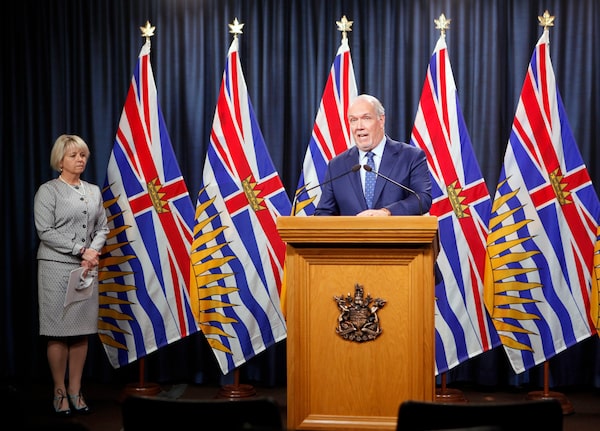
Provincial Health Officer Dr. Bonnie Henry looks on as Premier John Horgan speaks about the COVID-19 vaccine card set to arrive in mid-September as they discuss details about the process during a press conference at provincial legislature in Victoria.CHAD HIPOLITO/The Canadian Press
British Columbians flooded a government website on Tuesday to register for digital proof of their COVID-19 vaccination status, which will be required to access a range of non-essential businesses, from dine-in restaurants and pubs to fitness centres and sporting events, starting on Sept. 13.
The province’s vaccine passport is based on an individualized QR code, a scannable, square-shaped image made with bar-code technology. It stores the required clinical information, and can be displayed on a smartphone or printed as a paper record.
“The implementation of a B.C. vaccine card will allow us to ensure that those non-essential businesses that have been adversely affected by lockdowns and shutdowns and public-health orders can now confidently say to their patrons who have been double vaccinated, that they are operating a business that is safe for them to enter,” Premier John Horgan told a news conference on Tuesday.
The vaccine requirements will not apply to workers at those businesses, however. The province has sought to sidestep potential conflicts related to employment matters, and has only mandated vaccines for employees in long-term care and assisted living because of the high number of COVID-related deaths among seniors in care.
Vaccine passports pose an equity problem
RCMP union warns of COVID-19 vaccine enforcement impact
The fourth wave of the pandemic has brought what the Premier described as “an unacceptable surge” in COVID-19 cases that is once again threatening hospital capacity. It is primarily driven by the unvaccinated. According to the BC Centre for Disease Control, unvaccinated individuals are 34 times more likely to be hospitalized because of COVID-19 than those who are vaccinated.
While some individual business operators around the province have vowed to oppose the vaccine passport requirements, associations, including the BC Restaurant and Foodservices Association, have endorsed the system that promises to reduce the uncertainty of operating during the pandemic, and could pave the way to easing restrictions such as masks or capacity limits.
“What we hope as we move through these next few months with the B.C. vaccine card is that once there are only immunized people who are at these discretionary events, these social events, these businesses will be able to remove those capacity limits, because we know that we’ve mitigated the risk,” Provincial Health Officer Dr. Bonnie Henry said.
Without the new vaccine requirements, she warned, the arrival of autumn would likely result in more pandemic health restrictions because respiratory illnesses typically spread more quickly as activities shift indoors. “Without the card, optional discretionary, social and recreational events and activities might have needed even more restrictions and measures than what we have in place today.”
In a statement, the Greater Vancouver Board of Trade welcomed the passport system. “Our members support the implementation of the B.C. vaccine card as a tool for fighting the pandemic, increasing consumer confidence, and keeping our economy open and safe,” said the board’s president and chief executive officer, Bridgitte Anderson.
The province opened up online registration for the passports on Tuesday morning. It had issued 60,000 digital vaccine cards before the official launch of the system, although many early registrants experienced delays.
The vaccine card indicates whether the individual is either fully vaccinated or partially vaccinated. Partial vaccination is required by Sept. 13; and by Oct. 24, people will need to prove they are fully vaccinated to access a range of events and services, including indoor events such as weddings and concerts, restaurants with indoor or outdoor table service, pubs, movie theatres and fitness centres. Adults will also have to provide government-issued photo identification to ensure their name matches the one on their vaccine passport.
Dr. Henry said the province will not provide exemptions for individuals who cannot be vaccinated for medical or religious reasons.
“This is a temporary measure in high-risk settings,” she said. “It’s not practical for somebody who’s a server at a restaurant to be assessing whether somebody has a valid reason.” She said those who are not vaccinated can continue to get takeout food, and watch sports or movies from home.
British Columbia’s vaccine passport requirement is set to expire in early 2022, although that date can change depending on the state of the pandemic.
In the meantime, businesses will be required to verify their patrons’ vaccination status by scanning the QR code using a mobile QR code reader, or visually verifying the person’s proof of vaccination. Businesses that violate these measures can face fines of $2,300. Individuals who defy the requirement can face fines of up to $575.
Quebec, Ontario, Manitoba, Yukon and Newfoundland and Labrador have also announced plans to require proof of vaccination to access restaurants, bars and sports events.
We have a weekly Western Canada newsletter written by our B.C. and Alberta bureau chiefs, providing a comprehensive package of the news you need to know about the region and its place in the issues facing Canada. Sign up today.